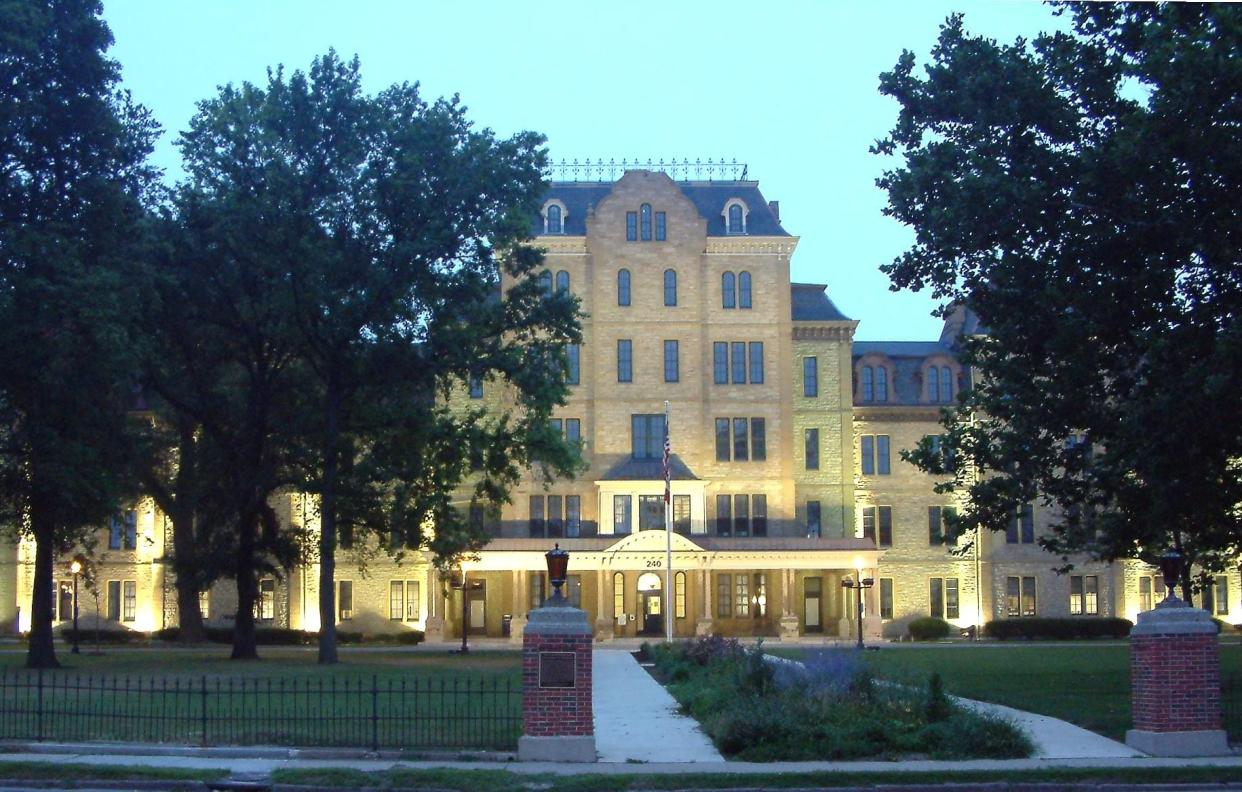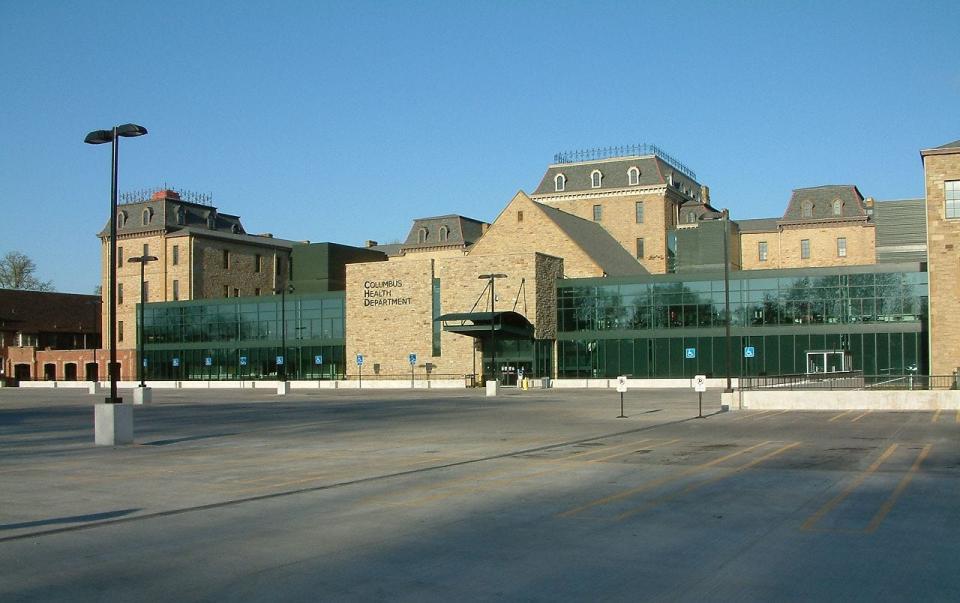An historic Columbus building is getting a major renovation meant to improve city services

The city's historic health department building in Olde Town East is getting a $21.5 million overhaul.
Columbus City Council on Monday night approved a contract with 2K General Company, based in Delaware, Ohio, for the construction work at the building located at 240 Parsons Ave. that dates to 1869.
The work is expected to start in September and will end in January 2025.
"The health department is more important than ever," Council President Shannon Hardin said at meeting, noting that demand for services continues to grow as space in the building becomes tighter.
The bulk of the work on the 60,000-square-foot building will take place on the third and fourth floors, according to the department.
The upgrades include heating and cooling, mechanical, electrical, plumbing and other work.
An elevator shaft that was never completed is going to be finished, and cranes will be used to bring supplies in and out of the third and fourth floors.
Construction of the main building began in 1869, and when it was completed in 1874, it was originally the Ohio State School for the Blind. The last significant renovations were in 2001 when Columbus Public Health moved in.

With the renovations on the third and fourth floors, the department will be able to add 199 workstations.
The work also includes adding a station for the supplemental nutrition program known as WIC to the first floor, an operations center to the fourth, a prayer room, additional breastfeeding rooms, and more conference and interview rooms.
The building will remain open during the work with some construction taking place after work hours or on weekends. No clinics will be moved for the renovations.
Council commits nearly $9 million to address housing issues
Council approved eight pieces of legislation and nearly $9 million to address housing issues whether it's helping people facing eviction, helping residents make repairs to their home and helping people with down payments on a house.
The legislation requires landlords to accept rent from third parties such as family members or social service agencies who are paying for tenants. It also passed a proposal called "pay to stay," allowing tenants who pay past-due rent with late fees before their landlord files an eviction action to use that as a defense during the action.
The moves come as evictions climb in the city amid a housing shortage that has sent the cost of renting or owning a home jumping.
“Housing cannot merely be a privilege afforded to a lucky few; it is a fundamental human right and needs to be treated as such,” Councilmember Shayla Favor said.
The legislation includes approved agreements with nonprofit social service agencies for up to $4.39 million in U.S. Department of Treasury emergency rental assistance funds to be distributed to eligible recipients beginning Tuesday (Aug. 1) and running through Sept. 30, 2025.
Legal Aid Society of Columbus was granted up to $1.5 million to provide legal representation to tenants facing eviction.
A separate, similar grant agreement to oversee distribution of emergency rental assistance funds was provided with nonprofit Gladden Community House for up to $155,890.
Council approved $1.25 million to fund Homeport’s affordable Easton Place Homes project. The total city commitment is $6 million over three phases and will result in a total of 200 affordable units.
Council also approved up to $400,000 in Treasury emergency rental assistance funds to Columbus State Community College to provide case management positions focused on ensuring housing for students within the Success Bridge program. Thousands of college students struggle with homelessness and housing insecurity, and a recent Dispatch investigation explained why.
The moves followed a number of commitments made by council in March to invest in the new development of quality and affordable units, the preservation of the current housing stock, and the inclusion of all Columbus residents.
Mayor Ginther zoo appointments confirmed
Council confirmed the appointment of four city officials to a new board meant to oversee the Columbus Zoo and Aquarium.
The new board follows a 2021 Dispatch investigation that revealed zoo executives allowed relatives to live in houses owned or controlled by the zoo, obtained tickets for their family members to attend various entertainment events, and raised questions about other expenditures. A forensic audit that followed concluded four executives used zoo assets on personal expenses, including concert tickets, golf memberships, Amazon purchases, satellite radio subscriptions and vehicles, resulting in more than $630,000 in zoo expenses.
Franklin County and the city have put in place a new agreement that will eliminate one of two boards with oversight over the zoo and ensure better financial accountability.
The board will have up to 19 members, including four members each appointed by the city and Franklin County.
The new members are Michael Brown, chief of staff to the council president; Kathy Owens, director of the city's Department of Finance and Management; Pamela Hykes O'Grady, deputy director of the city's Department of Technology; and Kenneth Paul, chief of staff for Mayor Andrew J. Ginther's office.
The terms expire July 31, 2026.
Economic development projects approved
Council approved $2 million in grants for three different projects as part of its economic development efforts.
Among them is $500,000 for St. Mary School to replace sidewalks and make roadway improvements around the building, which is undergoing an $18 million renovation, with a goal to make the area safer.
The council approved a grant of up to $500,000 to Elevate Northland for planning, design and construction of a new community center space in Northland that would continue providing training and business incubation assistance to that area.
Franklin County Commissioners also allocated $500,000 toward the project earlier in July.
Ronald McDonald House Charities of Central Ohio will receive up to $1 million in grant funds to go toward planning, design and construction of an expansion at its facility at 711 E. Livingston Ave. across from Nationwide Children's Hospital.
Council bolsters pre-K efforts
With a new school year approaching, the council authorized the executive director of Ginther’s Office of Education to enter into contracts with "high-quality" pre-kindergarten operators, selected through a competitive application process, to provide educational services at a cost of up to $5.9 million.
The program is meant to expand access to pre-kindergarten programs.
In other business:
Approved a $499,500 contract with the nonprofit Solar United Neighbors to implement a program to help low- to moderate-income residents get solar panels.
Approved granting up to $1.5 million to Freedom Equity, which is essentially operating as a bank or lender through the Columbus Urban League, for an existing micro loan program to support small minority businesses.
Approved spending up to $610,000 in a nonprofit services contract with Smart Columbus to support its ongoing efforts to transform Columbus into a national leader in mobility innovation.
Approved paying $491,000 to Ohio State University's Crane Center for Early Childhood Research and Policy to implement Ready4Success, an educational screening and improvement strategy, and Read it Again, Read it Again Math, and to provide a mid-year student assessment.
mawilliams@dispatch.com
@BizMarkWilliams
This article originally appeared on The Columbus Dispatch: City Council commits nearly $9 million on housing initiatives

